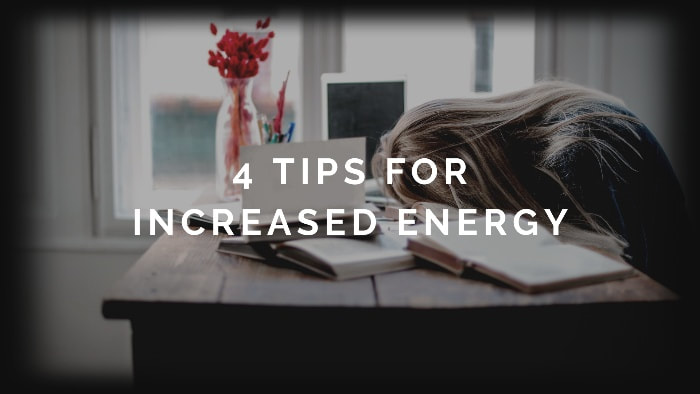|
When it comes to increasing our activity levels, for many of us a lack of energy (often perceived) is a common stumbling block. All too often I see people perplexed as to why they simply don’t have the energy to commit to consistent exercise. 9 times out of 10, the reason why is because they just aren’t on top of their overall well-being. How energized we feel, both physically & psychologically, is a product of how we look after our body & our inner environment. Therefore, to increase our energy levels, we simply need to make a few adjustments to our lifestyle, our behaviours, and our mindset. Here are 5 ways that you can do exactly that. SORT OUT YOUR SLEEPUnsurprisingly, our first port of call is sleep. If you complain about not having the energy to exercise yet have taken no measures to improve the quality & quantity of your sleep, then I simply don’t want to hear it. I think we all recognise that the quality & quantity of our sleep has huge effects upon our energy levels throughout the day and our mood. The well-rested state following a solid night of refreshing sleep is going to help provide both the initial drive to engage in activity & the energy to maintain it at a decent level. Perhaps what’s less known is that it also has direct impacts upon our nutritional decisions & levels of stress. With poor quality & quantity of sleep, certain hormones are affected that lead to increased appetite & a propensity to steer towards less healthful, high calorie food options. As I’ll delve into later, how we fuel our body also has direct implications on energy levels, so this is important. Despite these widely-accepted effects, so many people still routinely undervalue & neglect their sleep. So if improving sleep quality & quantity is key to increased energy, then how do we go about achieving that? Well, if you’ve read my previous blog on sleep, you’ll already have an idea, but here a few tips for doing so:
TAKE BABY STEPSLacking energy is rarely just a physical issue; there’s often a big psychological aspect. One of the biggest hinderances to engage in physical activity is being overwhelmed by the enormity of the task at hand. The mere thought of it can be draining. Believe me, I know the feeling. For me, one of the key ways to overcome this dread is to break the task down into small, achievable steps, & set the bar low for myself. Let me give you an example. Over the past few months I’ve been working on developing my cardiovascular fitness. Anyone who knows me knows that historically I’m no big fan of running. Typically, the day prior to a run, I’ll outline the type of workout or distance I plan on doing. The next day, when run-time comes about, it’s not uncommon for me to experience a real lack of motivation & a drain of psychological energy. But I know I need to get it done. So, I make it easier for myself. Firstly, I break the activity down into its micro-steps. I say to myself, “Ok, let me just get changed into my workout gear”. Done. I get a little at home warm-up/preparation done. I sort out a playlist for the workout, just to take the edge off things. By this point, I’m starting to feel a bit more engaged in the activity & motivated to get going. Next, I set the bar low. If I’m feeling particularly low on energy, I’ll reason with myself. “I’ll just run 2.5km, not 5km”. By doing this, the perceived effort required drops dramatically, allowing the task to seem more achievable and appealing. The magic of this is that often times, once you get going you end up finding the drive to complete the original full-distance. And even if you don’t - if you only hit the reduced target - you’ve still done something & that’s a whole lot better than nothing. ARE YOU FUELING WELL?As I mentioned earlier, how we fuel our body is absolutely central to our energy levels. Whilst individual differences mean there’s no universally optimal approach to nutrition, there are a few general guidelines worth following. Firstly, ensure that your diet predominantly consists of whole-foods. Essentially this means have high quality sources of protein & fats (grass-fed, organic meat), whole-grain carbohydrate sources, lots of fruit & vegetables. At the same time, limit your intake of processed, refined food products (to learn more about what these are, check out this article). By taking this approach, your blood glucose (sugar) levels will remain more stable across the day. If you instead opt to consume a diet of highly processed, high sugar foods, you’ll experience massive spikes in blood glucose - providing an immediate surge of energy, followed by a big crash in energy levels. Second, ensure you’re eating enough. Our body relies on energy intake (via food) to provide energy expenditure. If you drastically reduce your calorie intake, you’ll naturally feel lethargic - your body is deprived of vital nutrition & calories. If weight-loss is your goal, take a more moderate & sustainable approach. Sure, you need to be operating in a calorie deficit, but you also need to have the energy to be active. Thirdly, limit alcohol. Hopefully drinking alcohol pre-exercise isn’t something you’ve been putting into practice. But, pre-exercise or not, alcohol is going to affect your energy. Alcohol has direct implications on the quality of our sleep - which as I outlined earlier is crucial to energy. Finally, stay hydrated. Water is the main component of blood and is essential for carrying nutrients to the cells and taking away waste products. One of the first signs of dehydration is a feeling of fatigue. To help with this, I personally like to get into the routine of starting my day off with 2 big glasses of water. Obviously, it’s also key to drink plenty throughout the rest of the day. DEFINE YOUR GOALSAnother psychological tip. I know that when I lack direction & intention, my motivation, drive, & energy towards getting shit done completely drops. The best way to define the direction of your efforts is to outline some goals to work towards. Simply take a bit of time to not only think about the goals you’d like to achieve, but to actually write them down. Revisit them consistently, allowing them to act as a source of guidance, to prompt you into action, and to remind yourself why you’re doing what you’re doing. These can be both micro & macro goals - short & long term. First, outline the long term change you’d like to bring about. Next, get into the habit of defining your daily goals; the tasks you want to get done each day. Tick these off as you go through them - doing so can become a motivational activity in itself. Having this element of organisation & orientation in your life is absolutely crucial. Plus, if you’re smart about it, you’ll define goals that will help you to feel more energised (e.g. get 8 hours sleep each night, consume a nutritious diet). CLPT
Personal Trainer in Tunbridge Wells | Personal Trainer in Sevenoaks | Personal Trainer in Tonbridge Personal Training | Personal Trainer | Tunbridge Wells | Tonbridge | Sevenoaks |
Author
Christian Lawal Personal Training.
Personal training in Tunbridge Wells, Tonbridge & Sevenoaks. Archives
January 2024
|



